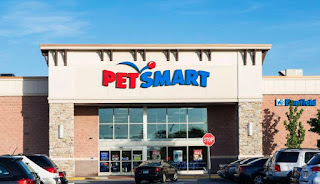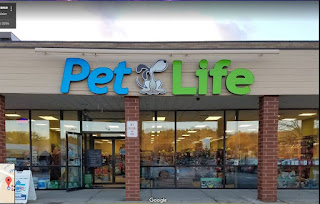Life Behind Bars – Texas Monthly
Why Holiday Spending Is Going To The Dogs
With the holidays ramping up, consumers are seeking out products for everyone on their lists. And for many, those lists include furry family members as well.
In fact, 80% of consumers said they consider pets to be part of their families when it comes to celebrating and buying gifts for the season, according to a survey Petco conducted of 2,031 shoppers in September 2023.
"Simply put, pets are important members of our families," Jenny Wolski, senior vice president of merchandising, supplies and owned brands product development at Petco, said in an email to Retail Dive.
So what's driving the focus on pets this holiday season and how are retailers capitalizing on the trend?
Growing humanization of petsWhile pets have been a part of families' lives for centuries, recently those animals are being viewed more as members of their households than ever before.
"One driver of it is just broader trends, especially with millennials and Gen Z that are either deciding that they don't want to have children or delaying having children. A pet is a great substitute for that," Wade BJubrey, associate partner in the consumer practice of Kearney, said. "I have two dogs, I don't have any children, but you can start to build this very similar relationship."
Pets are an "expression of the human lifestyle," Wolski said, adding that a key trend stemming out of the humanization of pets is the urge to buy more premium and better-for-you products for your pets. Retailers are responding: Petco, for example, in 2018 announced it would no longer sell pet food and treats that contain artificial colors, flavors or preservatives for cats and dogs.
The humanization trend has only accelerated in recent years. Consumers spent more time at home during the early days of the pandemic, which meant they saw their pets much more frequently. This was coupled with the fact that animal adoptions surged as consumers sought out companionship and sources of joy. The number of U.S. Households that owned a pet was projected to increase by 4% in 2020, according to Packaged Facts data. These factors led pet retailers to see a boost in sales during the onset of the pandemic even as consumers pulled back on spending in other areas.
"When I grew up having dogs, we would get a dog and the next day my parents would go to work and the dog would stay home for eight hours, and that was normal," Steven Cunix, an associate partner in the consumer practice of Kearney, told Retail Dive. "Now we don't leave our dog home alone for more than three or four hours because we got so used to it during COVID that they really became part of your family."
So when consumers start buying gifts for loved ones around the holidays, oftentimes that now includes pets as well.
"When holidays or special events come, you don't want to get gifts for your child and not for your pet."
Steven Cunix
Associate Partner at Kearney
More than 80% of pet owners said they were "very likely" to purchase a gift for their pet, while 54% said they would spend more time shopping for their pets than for some family members, according to a 2022 PetSmart survey conducted by Wakefield Research. And even as consumers were more selective about gifting last year, 34% of respondents said they would purchase a gift for their dog during the holidays, while 22% said they would buy gifts for their cat, according to a December 2022 Personal Capital survey conducted with Morning Consult. That's compared to just 19% of respondents who said they would buy a gift for their in-laws during the holidays.
As consumers view their pets as extensions of the family, they want to include them in more activities, whether that's buying gifts around the holidays or finding the perfect Halloween costume.
"We have a three-month-old daughter right now and we have a two and a half year-old dog. First thing my wife did when Halloween started coming was she's sending me all the different costumes that can match the dog with the baby," Cunix said. "The point is that the baby and the dog — she looks at them both as her children. When holidays or special events come, you don't want to get gifts for your child and not for your pet."
How retailers are capitalizing on the trendWith holiday spending projected to surpass pre-pandemic levels — Deloitte predicts sales between November and January could reach $1.56 billion, a 4.6% year-over-year increase — stocking holiday-related pet products could be a big opportunity for retailers.
And while e-commerce has grown in popularity in the pet space in recent years, especially for large items like bags of food that consumers can buy on a recurring basis to have delivered to their homes, there is still room for physical retail. Brick-and-mortar retailers stand to gain through the in-store events they offer, especially during the holiday season, according to Cunix.
To cater to pet owners — and drive visits to stores — Petco introduced its Merry Makings holiday collection, a one-stop shop that features more than 500 products, most of which are under $20, like Christmas and Hanukkah apparel, treats and toys. The retailer this year is also bringing back its photos with Santa event on Dec. 2.
"Pet parents see holidays such as Halloween, Thanksgiving, Hanukkah and Christmas as perfect opportunities to involve their pets," Petco's Wolski said. "In-store events such as photos with Santa at Petco help families celebrate and make memories with their pets."
Online pet retailer Chewy last year launched its "Letters to Chewy Claus" initiative, encouraging pets — and their owners — to get into the spirit by sending their wishlists to Chewy. The company said it would review the submissions, "determine who has been naughty or nice" and deliver gifts to thousands of pets. Chewy also touted its holiday collection, which included festive treats, toys, apparel and advent calendars.
"There's rarely a time I leave the grocery store without picking up something new for the dog."
Wade BJubrey
Associate Partner at Kearney
"As people see their pets in more of a human way, they see this opportunity to really celebrate and interact and enjoy their pets differently around holidays, birthdays," BJubrey said. "It really has gotten expansive where people want to purchase products for their pets."
While there is a level of uncertainty this holiday season as some consumers grapple with the resumption of student loan payments, the pet industry has historically been able to weather economic turmoil.
"The pet category is one that's really uniquely positioned. You have this recurring base, this foundational growth, that's going to be consistent because you need food and treats and things like that. But you also have a really nicely positioned category for impulse buys," BJubrey said. "There's rarely a time I leave the grocery store without picking up something new for the dog. It's so expansive now. It's across all these different channels, places you don't even think of as a pet store, you'll find pet treats, toys, etc. You may be going out for something else — you may be going grocery shopping — but you end up picking something else up. So it is nicely positioned to kind of capture that customer engagement."
As competition heats up in the pet category with more mass retailers offering an assortment of products, the holidays should be a key area of focus, BJubrey said.
"I think the opportunity for the other retailers — the other channels — is in the experiential, the holiday season," BJubrey said. "That's really where they have the opportunity to capitalize."
Why This Pinellas Commissioner Believes Pet Stores Can Humanely Sell PuppiesColumn
Published Oct. 14
Last year, the Pinellas County Commission decided to allow retail pet stores to remain in our community. This decision, I believe, led to a unique partnership that ensures the health and safety of puppies in our community's pet stores — and transparency about how they were raised.
Kathleen PetersLocal families deserve options and accurate information to decide how and where to find a pet. Research from the American Pet Product Association shows that half of American families seek out a pet store or breeder to find their next pet. They decide to go this route because they have a specific idea of their perfect family pet — a certain breed or a specific life stage (like a puppy) — or because they want background information like the pet's genetic history or medical information.
Only breeders and pet stores can provide specific breeds, guarantee that a puppy will be available and provide assurances about a pet's genetic or medical history. Sunshine Puppies, which owns two of the county's six pet stores, is providing confidence to families who want to know that a puppy was humanely bred and raised with care.
It's placing a priority on working with breeders who have received Canine Care Certification, a voluntary set of care standards for breeders that are rooted in science and backed by research. Managed by Purdue University, the care standards address everything from housing and socialization to veterinary care and genetics for puppies.
Canine Care Certification also mandates that breeders have an adoption program in place for the puppies' parents. Currently, the science-based guidelines call for retiring the puppy's parents at 4 to 7 years old, depending on a number of factors.
It's not enough to promise that a pet was bred by a compassionate breeder. Sunshine Puppies is now partnering with SPCA Tampa Bay, a Largo-based animal welfare organization that had previously supported the pet store ban, for veterinary care. Acting as a watchdog for puppies in the stores, SPCA Tampa Bay's veterinarians are visiting Sunshine Puppies' two stores each week to keep an eye on puppies who are awaiting homes. They're examining puppies' physical condition, reviewing their health histories and completing the documentation that Florida law requires for puppies to be sold.
SPCA Tampa Bay is also testing a pilot program to rehome the puppy parents through its shelter. This collaboration between private businesses provides transparency about pets' origins and health and accountability to do the right thing for the animals. If successful, it could be a new approach to preserving residents' choice about their next pet while addressing concerns about how pets in stores are being raised.
Kathleen Peters is vice chairperson of the Pinellas County Commission.
🌱 Teen Car Chase Video + Plaza Pet Costumes + Hotel Staffer In Court
Hey, everybody! I'm back in your inbox today with all the most important things happening in Healdsburg. In this issue of the newsletter, you'll find updates on:
First, your local weather:
Air over Healdsburg:
Healdsburg in the news:
Recent death in town:
Check out what our local sponsors can do for you:
Click here to get your business featured in this spot.
Wednesday, Oct. 25
Thursday, Oct. 26
Friday, Oct. 27
That's all for now. See you right back here tomorrow!
— Simone Wilson
About me: I was born and raised in Healdsburg, CA, where I was the editor of the Healdsburg High School Hound's Bark. I have since worked as a local journalist for publications in San Diego, Los Angeles, New York City and the Middle East — and most recently, as a senior product manager for Patch.
Have a news tip or suggestion for an upcoming Healdsburg, CA Patch newsletter? Contact me at simonewilson@gmail.Com





Comments
Post a Comment